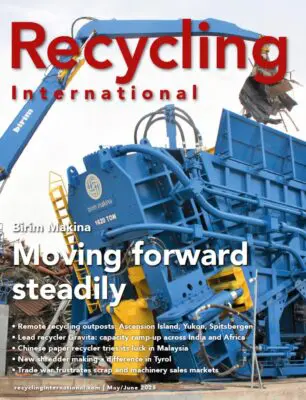32
Join us for the Canadian Association
of Recycling Industries’ 84th Annual
Convention. Register now:
cari-acir.org/events
roads at all’. Many remote communi-
ties in Canada lack reliable access
routes. The report describes the
example of Seton Portage in British
Columbia, that can only be reached
via steep, narrow roads with grades
exceeding 20%. Meanwhile, St.
Theresa Point in Manitoba is accessi-
ble in winter only by ice roads, while
many coastal communities depend on
barges or having to cross bridges
with strict weight limits. ‘Obviously
these logistical hurdles complicate
the safe transport and management
of ELVs and hazardous materials,’ says
ARC.
SAFETY HEADACHES
ELVs left for years in remote areas are
often stripped of parts or damaged
by the elements. These conditions
make handling and processing more
hazardous and labour-intensive,
requiring careful safety measures.
ARC also points to an inadequate
infrastructure and local resources.
‘Remote communities typically lack
the specialised equipment, training
and personnel required for ELV recy-
cling. Contractors are not always
available locally, meaning expertise
and machinery must be brought in
from outside, which means extra time
– making it all even more complex.’
Canada’s climate adds another layer of
difficulty, with extreme cold, heat and
heavy rain or snow all posing opera-
tional challenges. ‘Any plan for pro-
cessing ELVs in remote communities
must include unforeseen weather.’
NICHE EQUIPMENT SUPPLIERS
Remote recycling outposts offer an
exciting niche market for recycling
machinery suppliers. ‘But only if
you’re willing to put an extra step and
invest extra time and energy,’ says
Hubert Mackowiak, sales manager at
shredder producer Pronar in Poland.
The company exports machinery to
more than 80 countries. Their custom-
ers include recyclers on remote
islands. ‘French overseas islands like
Reunion, Mauritius in the Indian
Ocean, Guadeloupe, Martinique and
other French territories offer growing
business for us.’
These islands have implemented envi-
ronmental regulations similar to their
motherland France and have no
choice other than to adapt. ‘These
island communities need to invest in
tools and machines that help them in
doing recycling in a proper way.’
Shredder supplier Hammel of
Germany has also witnessed growing
demand from recyclers in the
Caribbean in recent years. ‘We’ve
delivered many machines to these
islands.’ Among Hammel’s most
remote customers, however, is a recy-
cler in Alaska.
MOBILE RECYCLING TOOL FOR REMOTE AREAS
What has been called ‘a groundbreaking solution’ is
reshaping waste recovery in remote places, especially
on islands. The EU-funded Reclaim project has unveiled
a mobile, AI-powered robotic recycling plant designed
for use in such infrastructure-limited areas. Initially
deployed in the Greek Islands, the compact system is
housed in a container and can be quickly transported
Longyearbyen on Spitsbergen.
28-29-30-32-33-34_remoterecyclingoutpost.indd 32 10-04-2025 12:20




